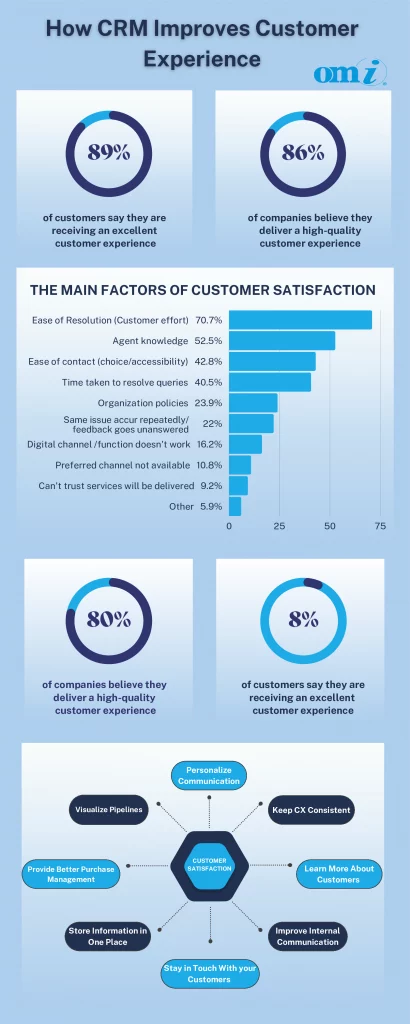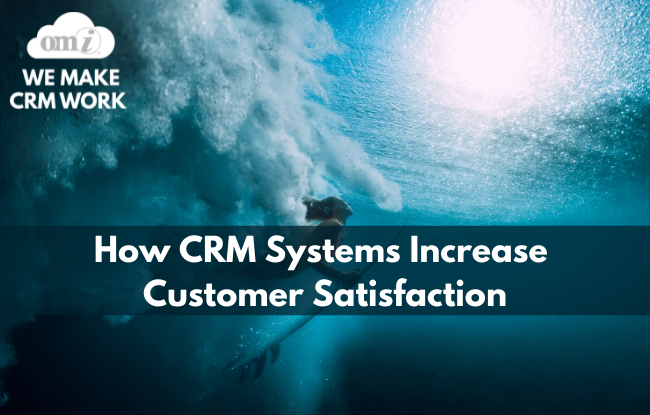CRM systems are meant to enhance the way you communicate with each and every one of your clients. In other words, they do a lot of heavy lifting for you so you can focus on other aspects of your business. If having a semi-autonomous system built around your business that talks to your customers (old and new) for you on different platforms, and reports back to you sounds like a lot, that’s because it is.
Unfortunately, this means that the initial setup of a CRM can be quite challenging. They can be notoriously difficult to implement if you don’t have the expertise, and, depending on the solution you settle on, they can cost quite a bit too. Is it all worth the trouble then? What benefits do they actually bring and how does it all work to make things better for both you and your clientele?
Why is Customer Experience Important?
It all starts with the person at the center of your enterprise – the customer. Whatever industry you may be in, your client will always be spoilt for choice. If you cannot provide what and when they need it while providing a positive experience for them throughout the process, there will always be a competitor waiting to do it for you. The relationship you build and maintain with your clientbase thus becomes incredibly crucial to the success of your enterprise. You will want to keep old clients happy enough to keep coming back, and you’ll want new leads to be sold on what you have to offer. The question is, how?
Customer Satisfaction Factors
Beyond the quality of the product or service you are offering, there are a few criteria that have the most effect on clients’ perceptions of your brand and how satisfied they are after interacting with your company.
Customer Experience With Your Business
With every interaction you have with a client, they are forming, modifying, or reinforcing their opinion of your brand. Are issues attended to quickly? What is the attitude of your service staff? You want to make sure all your communication stays on brand and addresses whatever their needs are at the time in a satisfactory way.
Ease of Communication
Your clients will come to you from different platforms. Some will walk into your premises, others will phone in, and an even greater number will attempt to connect with you on numerous digital platforms. You want to make sure that their attempts to connect with you are not in vain.
Personalized messaging
One of the cardinal sins brands make is to spam their clients. Unfortunately the line between spamming and providing useful information is incredibly thin. Businesses that successfully walk that tightrope reap generous rewards. If you are sending newsletters or special offers, make sure they are going to the right people and the messages that deliver them are personally relevant to them.

Sources: Oracle.com, Statista.com, Bain.com.
Types of CRM Systems
CRM systems aim to help you overcome these challenges and provide the type of customer service that will leave your clients expecting. Let’s take a look at some of the types of CRMs there are and what features they have to offer.
Operational CRM
Operational CRMs are meant to, as you may have guessed, enhance processes pertaining to business operations. This means the activities that are more customer-facing, such as marketing, customer service, and sales. The CRM takes on some of the repetitive tasks, speeds up response times, eliminates human error from some processes, and generally helps to make the customer’s experience smoother and the company’s service provision more efficient.
Analytical CRM
On the other end of the spectrum we have the analytical CRM. This helps with all of the tasks that go on behind the scenes to ensure the customer experience is seamless and uninterrupted. This means collecting, storing, and managing the data that supports operations, analyzing metrics to help attract new customers and retain old ones, or ensuring that the data required in order to send personalized messages is readily available. In a nutshell, an analytical CRM helps your business make the most of data from your customers and from your operations – sales, marketing, and customer service for example – to ensure every client is happy.
Collaborative CRM
In the middle of it all sits the Collaborative CRM. In a typical business, data from one department is used by another. A collaborative CRM ensures that data flows efficiently. Leads from marketing must be followed up by sales staff. Closed deals will affect accounting. If there are incentives for sales reps, this data is crucial for HR as well. Having a CRM that provides a structured approach to the distribution and management of this data ensures there are no bottlenecks and the organization functions optimally.
Key Features CRMs Should Have
While there are different types of CRMs, and all of them fulfill different functions, there are still a number of key features that are common to them:
Data management
A good CRM ensures that data is readily available in a timely manner to whoever needs it. This could be the client, client-facing employees like sales reps, or back-office staff that help ensure business operations run smoothly. For decision-makers, concise and timely data presented in an easily understandable way is crucial. So the analytics and reports that CRMs generate from the data are also extremely important
Automation
One of the most powerful features CRMs offer is the ability to take repetitive tasks off the hands of employees. This means turnaround times are faster – a plus for the customer experience, and employees can take on more meaningful tasks – excellent for employee motivation. As an added bonus, automation also means there are fewer mistakes due to human error.
Integration
By pulling data from different sources, CRMs provide a means for company staff to see all the information that is relevant to them in one place. This helps efficiency in the business (staff do not have to switch between platforms) and eliminates redundancies. It also contributes to a positive customer experience when, for example, a CRM enables you to identify a client on different platforms so you can refrain from sending them the same messages everywhere, or simply start a conversation with them on one platform and seamlessly continue it on another.
8 Ways CRM Systems Improve Customer Experience
With all that said, what are some of the practical ways in which CRMs bring tangible benefits to your clients?
Stay in Touch With Your Customers
In business communication – timely communication – is absolutely essential. CRMs help you achieve this.
Quickly Respond to Requests
Using things like chatbots and other innovations that use the power of AI, you can automatically respond to clients requests and even carry on a personalized relevant conversation with them without any human input. This power of automation means clients no longer have to wait for information.
Provide a Proactive and Attentive Customer Service
Because CRMs provide information when it is needed, your customer service staff and sales representatives will always be equipped to provide the help and information that will help your clients. If you have AI capabilities, you can even run predictive analyses that will help you identify problems and opportunities even before they occur.
Make Your Communication Personalized
How do CRM systems help firms achieve customer intimacy? With a CRM, you don’t have to, for example, send bulk “Dear valued client,” emails. Correspondence can be addressed personally to your client, and even continued on other platforms without a break in the communication. This gives the customer a more positive view of your business and their experience.
Keep Your Customer Experience Consistent
By maintaining one centralized source of data, you can be sure that the messaging to your clients remains the same. Even if you switch sales reps or service staff, new employees will have access to the entire history of your interactions with the customer, and beyond the change in personnel there should be no impact on the client themselves.
Provide Better Management of Purchases
Streamlined data, the ability to forecast sales and other such tools means that you can also manage your inventory better. There are tools that can help you prepare for seasonal highs and lows, and some of those tasks can even be automated and taken off your hands altogether.
Store All Your Information in One Place
A centralized store of information has various benefits. The lack of data duplication reduces errors, it ensures everyone in the organization is working off the latest reliable information, and it makes more efficient use of your IT hardware and infrastructure..
Improve Internal Communication
A good CRM will not just make data available to the relevant people in your organization, it will also facilitate communication between them. So it isn’t just a case of hard numbers and cold facts, but additional context-based insights provided by staff where necessary.
Learn More About Your Customers
In the course of their operations, businesses accumulate large amounts of data. CRMs organize that data into a presentable, actionable and easily understandable format. There are many insights that can be drawn from this information to help you understand the needs of the people you serve much better.
Visualize Pipelines
Company operations are typically a complex maze of interrelated steps. From a strategic standpoint, it helps to clearly visualize the inputs and outputs of each. This way, it is easy to identify inefficiencies and implement improvements.
How to Properly Use a CRM to Increase Customer Satisfaction
Getting a CRM to work for you is probably the most difficult step in the entire process. It is, however, the most important, so it is critical that you get it right. Get seasoned experts on board to help you ensure that your solution is tailored to your needs and functions in a way that actually makes your company’s operations better. Otherwise, the whole thing is simply an exercise in futility.
Conclusion
While it might take some time and effort to get your CRM implemented the way you want it to work, your customers will thank you – and handsomely reward you – for it. A CRM will do wonders for your competitive edge in a world where choices abound and customers will desert you for the smallest misdeed.
